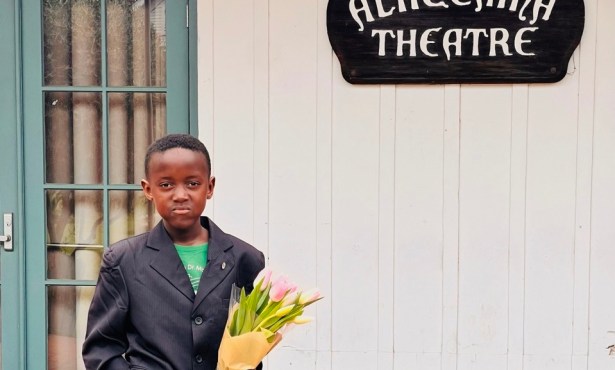Orpheus Chamber Orchestra at the Granada
Augustin Hadelich Performed with Orpheus on Monday, November 30
With this concert, the brainy musicians of the Orpheus Chamber Orchestra proved that even the most complex modern music could still be a lot of fun. In their last two appearances for CAMA, Orpheus brought world-renowned pianists Richard Goode (in 2003) and Emmanuel Ax (in 2006); this time they arrived with violinist Augustin Hadelich as soloist. Many of you will remember Hadelich from his appearances with the Santa Barbara Symphony, and in particular a memorable performance of Beethoven’s Violin Concerto in D Major at the orchestra’s final concert at the Arlington in May of 2008. Hadelich has grown as an artist since 2008, and he arrived here close on the announcement that he would be the recipient of the 2015 Warner Music Award, a new $100,000 personal grant created by the board of New York’s Carnegie Hall for talented musicians under 35. The entire program reflected what’s current at Carnegie Hall, as it is a home venue to Orpheus. The same program that we heard in Santa Barbara would be performed there less than a week later, on Saturday, December 5.
So what was on this doubly Carnegie Hall-bound program? Several very interesting and beautifully executed works designed not only to showcase the conductor-less ensemble’s flawless performances, but also to demonstrate the ways they aim to push the quite specific art of the chamber orchestra ahead. The opener, the Concerto Grosso in D Major, Op. 6, No. 5 of G.W.F. Handel, served as an announcement that this would be an evening of musician’s music, saturated with the heady atmosphere of Handel’s unprecedented range and awareness. It made a perfect introduction to what Orpheus does best, which is to integrate the lines of orchestral compositions in such a way that each remains distinctly audible as the product of a single musician and instrument. In other words, Orpheus is serious about realizing the “chamber” ideal of individual voices for each part.
The Divertimento from Le Baiser de Fee for Violin by Igor Stravinsky was essentially a premiere for the arrangement by Dmitry Sitkovetsky. Sitkovetsky is probably best known for his string trio arrangement of Bach’s Goldberg Variations, a popular choice. The commission of this Stravinsky Divertimento arrangement by Sitkovetsky for chamber orchestra and violin is the result of discussion between Hadelich and Orpheus, and it looks likely to earn its way into the contemporary chamber orchestra repertoire. In the second movement we heard the evening’s only truly shocking notes, as the composer deployed such disruptive modernist devices as fragmentation and splicing. Hadelich’s crisp articulation on the violin kept things musical through this thicket of modernist neo-classical innovation.
After the intermission the soloist returned for the evening’s big crowd pleaser, Tchaikovsky’s Valse-Scherzo Op. 34. The many double-stop sequences and a dazzling cadenza elicited bravos from the audience. Cellist James Wilson, an alum of the Music Academy of the West, gave a charming spoken introduction to the final composition, Ottavino Respighi’s The Birds. Despite the ornithological emphasis, The Birds would be more accurately described as a chamber music gem than a barnyard soundtrack. Orpheus once again provided a welcome and satisfying contrast to the more stately sound of other international orchestras.



